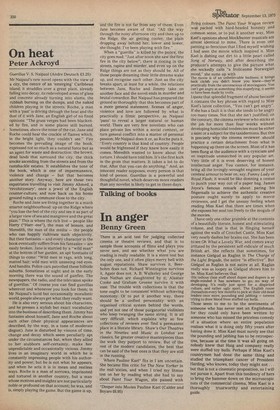On heat
Peter Ackroyd
Guerillas V. S. Naipaul (Andre Deutsch £3.25) Mr Naipaul's new novel opens with the view of a city, the centre of an 'emerging' Caribbean island; it straddles over a great plain, already falling into decay, its redeveloped areas of glass and concrete already turning into slums, the rubbish burning on the dumps, and the naked children playing in the streets. Roche, a man with a 'past' is driving through the heat and the dust of it with Jane, an English girl of no fixed opinions: "The grass verges had been blackened by fire, and in some places still burned. Sometimes, above the noise of the car, Jane and Roche could hear the crackle of flames which, in the bright light, they couldn't see." Fire becomes the prevailing image of the book, expressed not so much as a natural force but as an agent for waste and destruction: the brown, dead lands that surround the city, the thick smoke ascending from the streets and from the ramshackle estates. It establishes the tone of the book, which is one of impermanence, violence and change — but that becomes another story. Anyway, here are these two expatriates travelling to visit Jimmy Ahmed, a 'revolutionary', once a jewel of the English counter-culture, and now back on his home ground ruling a commune close to the city.
Roche and Jane are living together in a much smarter neighbourhood: up on the Ridge where "you lose the feel of the city and see it as part of a larger view of sea and mangrove and the great plain." This is where the rich live — people like Harry ("Harr—eee"), the man of leisure, and Meredith, the man of the media — the people who can happily cultivate such objectivity. But their fantasies — and every character in the book eventually suffers from his fantasies — are easily broken. Jane is startled by a "wild man" at the bottom of her garden, an apt foretaste of things to come: "Wild men in rags, with long, matted hair; wild men with unseeing red eyes. And bandits. Police cars patrolled these hillside suburbs. Sometimes at night and in the early morning there was the sound of gunfire. The newspapers, the radio, and the television spoke of guerillas." Of course you can find guerillas wherever and whenever you look for them; in Mr Naipaul's lucid but occasionally moralistic world, people always get what they really want.
He is also very serious about his characters, and he presses a stylish but exact vocabulary into the business of describing them. Jimmy has fantasies about himself, Jane and Roche about each other (their physical appearances are described, by the way, in a tone of moderate disgust). Jane is disturbed by visions of time, change and decay which seem peculiarly apt under the circumstances but, when they allied to her stubborn self-certainty, make her unpredictable and occasionally vicious. Jimmy lives in an imaginary world in which he is constantly impressing people with his authority and power; but he is not what he appears, and when he acts it is in mean and restless ways. Roche is a man of sorrows, imprisoned and tortured in another country, but a man whose motives and insights are not particularly noble or profound on that account; he was, and is, simply playing the game. But the game is up, and the fire is not far from any of them. Even Jane becomes aware of that: "All the way through the noisy afternoon city and then up to the Ridge, the air getting cooler, the plain dropping away behind her, lower and lower, she thought: I've been playing with fire."
When a "guerilla" is killed by the police, the city goes mad: "Just after noon she saw the first fire in the city below"; there is rioting in the streets, rapine and murder, and even up on the Ridge things are not as they should be. All of those people dreaming their little dreams wake up, and recognise each other. Just as the city breaks apart, at least for a while, the relations between Jane, Roche and Jimmy take on another face and the novel ends in murder and brutal cowardice. But Naipaul has prepared the ground so thoroughly that this becomes part of a more general statement. Scenes of anger, violence and love are followed by what is practically a filmic perspective, as Naipaul 'pans' to reveal a larger natural or human world. There are very few novelists who can place private lies within a social context, or turn general conflict into a matter of personal passion; Mr Naipaul does it or, as Roche puts it, "Every country is that kind of country. People would be frightened if they knew how easily it comes. Meredith wanted to know about the torture. I should have told him. It's the first kick in the groin that matters. It takes a lot to do that. After that you can do anything." And, an innocent reader supposes, every person is that kind of person. Guerillas is a powerful and thoughtful novel, which deserves more readers than any novelist is likely to get in these days.


































 Previous page
Previous page